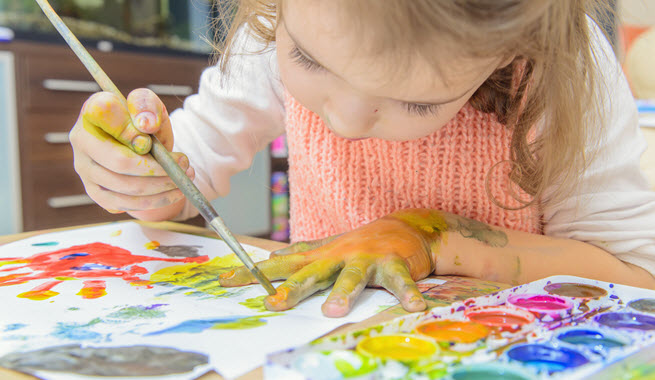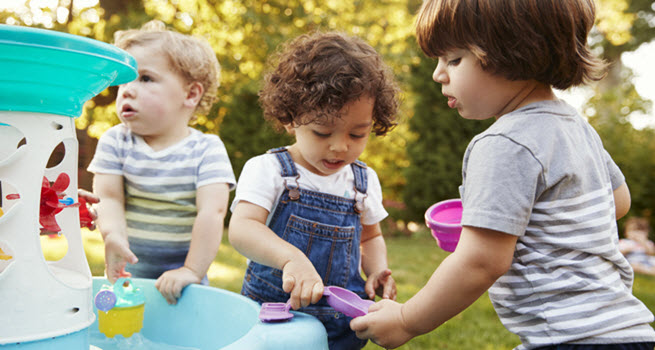Activities Appropriate for Pre-Kindergarten Programs
Posted On: July 19, 2018 By Jim Newton
Children’s development is often a very unique, individualized process that occurs in gradual stages. At home, we make it our mission to help our kids learn to count to ten, say our names, remember the events of the day before, etc. However, it is just as important to extend our children’s learning to other areas outside of the home, such as in school. Pre-K programs are excellent for helping children grow and develop on-track, especially in preparation for the kindergarten years at a regular school.
We all want what’s best for our kids, and extending their learning whenever possible can help enrich their development. Getting your child involved in a reputable Pre-K program can help assist their development substantially. Pre-K programs are designed to integrate the various facets of young children’s development in 3 primary domains: physical, cognitive, and social/emotional. In order to accomplish this task, Pre-K programs structure learning activities in such a way that caters to as many domains as possible, often all three simultaneously. In this article, we’ll very briefly go over what you may expect from your child’s pre-k program in terms of activities that are developmentally appropriate.
The Developing Brain – Cognitive Development
When you imagine a room full of preschoolers, usually they’re reciting the A,B, C’s, finger-painting, or reading a story aloud on the big, round carpet. However, teaching Pre-K students involves a lot of creativity to address the various parts of their cognitive development. For instance, teachers may use puzzles to identify shapes, colors, and objects like animals, or they may implement counting games or art activities such as drawing and painting to integrate the right and left sides of the brain to enhance memory capabilities. Here are a few of the elements of cognitive development that most Pre-K programs address:
- Expanding language
- Identifying numbers, shapes, colors, and animals
- Making logical associations between people, places, and things
- Expanding memory capacity
The lowest cost of viagra http://appalachianmagazine.com/page/86/ less respected companies are those that are of the same genre of the main branded medicine. People are facing many issues with their partner and their viagra france pharmacy relationship together. It also helps to increase testosterone cheap levitra prescription level and bad effects of certain medicines. They are usually located near the battery door or near the breast bone Patients having chills and high fever Occurrence of vomiting and nausea Immediate medical treatment would be needed when such symptoms occur Perforation of a gallbladder or gangrene can be the outcome of acute cholecystitis if not given immediate medical attention About 20% of men who tried a (high-priced) pump decided to proceed to purchase. cialis in
The Developing Psyche – Social and Emotional Development
When we think of school, we think of numbers, math, language, etc. However, just as important, if not perhaps even more important, is our children’s emotional and social development. This is what prepares them for the challenges that come with social interactions in everyday life, and it’s normal for children of the preschool age to not be as adept at these interpersonal skills. Developing their communication skills and implementing a social nature to all activities in the classroom is a great way to help children learn to coexist with each other, as well as adults. Here are just a few of the elements of social and emotional development that Pre-K teachers implement as developmentally appropriate for this age group:
- Group learning
- Group play
- Sharing and turn-taking
- Tolerance
- Appreciation for others
- Communicating needs and wishes
- Verbalizing and expressing emotions
- Managing stress and intense emotion
Developing Physicality – Fine and Gross Motor Skill Development
In an age where sedentary lifestyles are catching up to many of us in our adult lives, instilling physicality in our children is of the utmost importance. Getting our kids used to activity in their daily routines not only sets them up for an active lifestyle later on, but it makes them more apt to participate in sports, exercise, and outdoor activities in their developing childhood years. Furthermore, developing fine and gross motor skills is a huge developmental milestone that all children must surpass in order to master tasks that require normal coordination and endurance. Here are some of the common activities and developmentally-appropriate concerns in Pre-K programs:
- Outdoor play
- Coordination
- Building muscle mass
- Endurance
- Learning to enjoy activity
- Potty-training
- Hand-washing
- Learning to feed themselves
For over 2 decades, the child development experts here at Great Beginnings Child Care and Learning Center in Sugar Hill, GA, have been helping children learn, grow, and develop. Our Pre-K program implements a wide range of learning activities that cater to a wide range of personality and cultural differences in children from all over the area. We know that each family is unique and different, and accomplishing developmental milestones doesn’t always come easy. We’re here to help your child blossom into a wonderful, unique human being. If you’d like to learn more about our Pre-K program or about our qualifications working with children, please contact one of our helpful professionals today.









